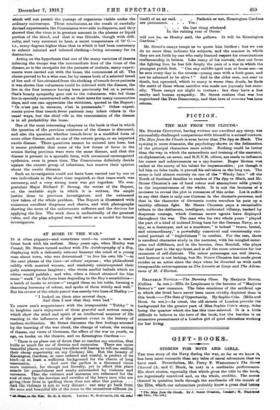AT HOME IN THE WAR.-
IT is often piquant—and sometimes cruel—to contrast a man's latest book with his earliest. Many years ago, when Henley was Consul, Mr. Street turned author with• The Autobiography of a Boy, displaying with a delicately reticent humour the mind of a young man about town, who was determined " to live his own life "—in the cant phrase of the time—at others' expense ; who philandered mildly with married women, and resolutely misinterpreted their gaily contemptuous laughter ; who wrote soulful ballads which no editor would publish ; and who, when a friend obtained for him some " work " in the form least degrading to the Boy's sensibilities— a batch of books to review—" ranged them on his table, forming a charming harmony of colour, and spoke of them wittily and well." But his review of the whole parcel was merely two lines of Shelley :—
" I looked on them nine several days, And then I saw that they were bad."
To renew one's acquaintance with the irresponsible " Tubby " is to heighten one's enjoyment of these graceful and serious essays, which show the mind and spirit of an intellectual amateur of life reacting to the influences of the greatest event in the history of modern. civilization. Mr. Street discusses the first feelings aroused by the bursting of the war cloud, the change of values, the mixing of classes, our views of Germans, the effect of the war on youth, on age, on books, on the theatre, and on Kensington Gardens :- " There is no place out of doors that so catches my emotion, that holds so much for me of dreams and memories. There are more beautiful places, so vaunting travellers will hasten to tell me, smiling their cheap superiority on my Cockney life. But the beauty. of Kensington Gardens, at once ordered and wistful, is perfect of its kind—is at leant a sufficient background for the charm of long asaooiation. . . . And now the pathos is a thousand times more insistent, for though not literally, yet in effect this place stands for peacefulness and sanity surrounded by violence and unreason. That the violence and unreason are redeemed for the soul of men. by the heroism and sacrifice of the brave men who are giving-their -lives in quelling them does not alter this pathos. . . . And the violence is not so very distant : one may go back from the sane and beautiful life of the trees to the monstrous silliness (in
• 40-rgissara An War. Be G. S. Street. London ; W. Heinemann. PS. 64. =LI
itself) of an air raid. . . Pathetic or not, Kennington Gardena are permanent. . . . Yes : . . . the last thing whelmed In the ruining roar of Doom' will not be, as Henley said, the gallows. It will be Kensington Gardens."
Mr. Street's essays tempt us to quote him further ; but we can do no more than indicate his subjects, and the manner in which they are set forth by one who early learned respect for conscientious craftsmanship in letters. Like many of his coevals, shut out from the fighting line, he has felt deeply the pain of a war in which the youngest perish first. " Can any middle-aged man at home see—as he sees every day in the streets—young men with a limb gone, and not be ashamed to be alive ? " And in the older men, not sent to death, but uprooted, which to many is worse than death, he finds the merit of those whose sacrifice was made not joyously but stoio- ally. These essays are slight in texture ; but they have a fine sanity and human sympathy. Mr. Street realizes that war has engendered the True Democracy, and that love of mentev has-been reborn.










































 Previous page
Previous page